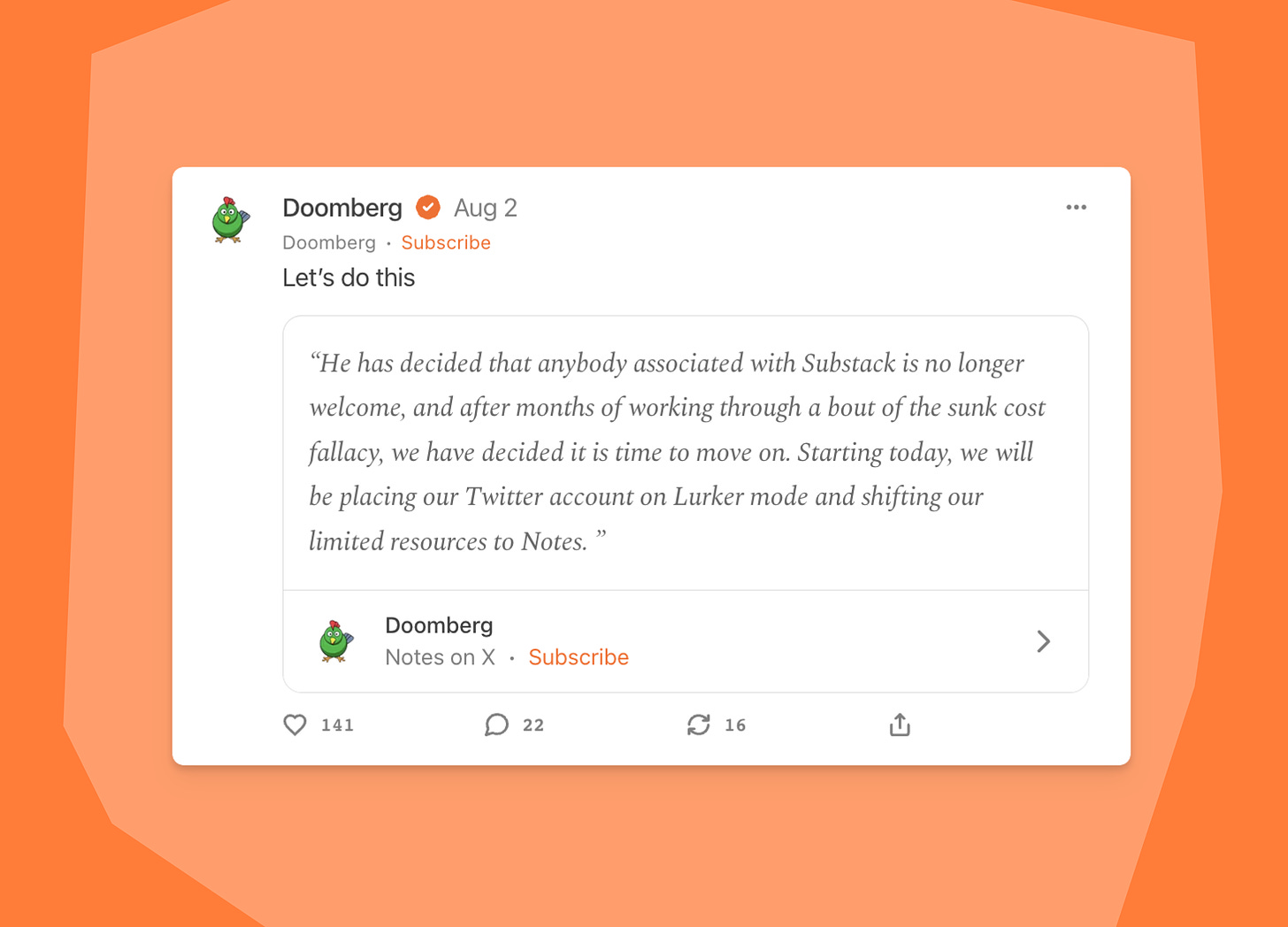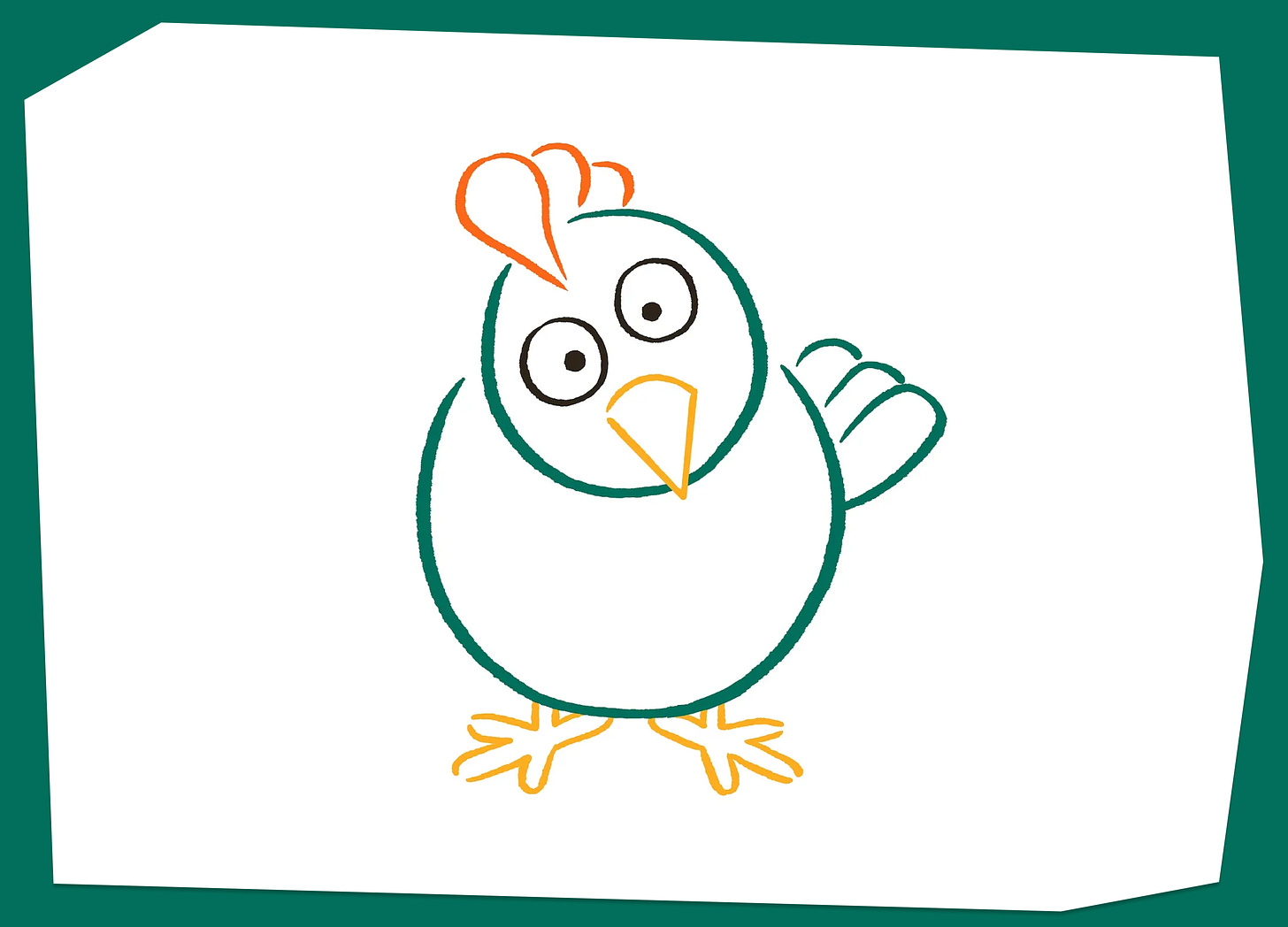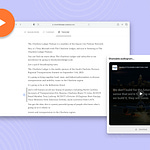In early August,
, the leading publication in the finance category on Substack, announced that they were opting out of X (fka Twitter) and putting all their focus on Substack.The Doomberg team had built much of their brand and reach on Twitter through a strategy that leaned on getting their goggle-eyed green chicken avatar in front of as many people as possible through timely tweets, threads, and storytelling around their Substack posts. They coupled this active Twitter presence with appearing on as many podcasts as they possibly could to deepen their relationship with finance-minded readers (listen to our interview with Doomberg for The Active Voice for more on that strategy).
Shifting their focus entirely to Substack, with an emphasis on Notes, was a bold move by the green chicken, but they say the decision was ultimately straightforward. They came to feel that X was operating against their interests, while Substack was directly aligned with them. “We settled on Notes because the team at Substack has been our partner from the beginning,” Doomberg wrote.
I got on a Zoom call with the green chicken to dive deeper into their thinking behind the move and explore what it says about long-term thinking. I hope some of these takeaways are useful for all independent writers. You can listen to the interview above, read the full transcript attached to this post, or enjoy a condensed version of the discussion below.

Hamish: How much of this move is tied to the specific ethics of that one platform (Twitter) and that one person running the platform, versus a broader philosophical position on how one thinks about the ownership one has over one’s audience and the level of control you have?
Doomberg: If the new owner of Twitter had not specifically and proactively throttled all Substack authors, we would almost certainly still be on the platform. It’s his private property. He can run his property in any way that he sees fit... but the primary driver and the motivation to leave the platform was because of the impact on all of our friends.
Hamish: Notes is small by comparison to Twitter and other social media platforms. It’s just beginning, it’s a baby, and yet you’re putting so much of your energy and effort and time there now. But how much do you think of that as a shift of emphasis and investment to this specific short-form content feed, versus a more holistic approach to investing in the Substack ecosystem?
Doomberg: It’s much more the latter, but I would say we started with zero followers on Twitter, so we’re used to building something starting small, and we are starting not so small on Notes. We have 176,000 emails, which means we have 176,000 potential people to interact with on that platform.
A really hard-learned lesson in life is you can’t make a good deal with a bad person. Whatever you think of the new owner of Twitter, and we probably don’t even need to go down that vertical, but the people that we have met at Substack have all been genuinely good people. And I do think you can make a good deal with good people.
Hamish: You’ve listed among your key goals “helping other Substackers or helping other Substack writers.” Why do you say that?
Doomberg: Well, first of all, it’s just a karma thing. We’re big believers in surfing the sea of abundance and that the NPV [net present value] of giving is infinite. It costs you nothing to help other people.
But also, the more people who join Substack, i.e. the more authors we help who bring their audiences into the Substack ecosystem, you get that network effect, and maybe one of them sees the [Doomberg] green chicken because of a recommendation or they see a note or an author they like; or they restack one of our pieces with a compliment. And that’s a great way to grow and to beat back churn.
And so if there’s 30 million subscriptions in Substack today and 2 million of them paid—I don’t know what the exact numbers are, but that feels about right—if that number grows to 250 million subscriptions, is Doomberg better or worse for that? It’s better by a lot.
Hamish: Right.
Doomberg: And so it feels like the early days of YouTube, and it’s an asymmetric bet. If Substack wins and becomes the YouTube of writing, except driven by subscribers and not ads and so on, then we would be early like Bill Bishop and the other big names... OGs in something that blows up—and what a great victory that would be for all of us.
And if it doesn’t, we still have our own business. That’s one of the beauties of the Substack model. We have our email list that we own and we could port to a website of our own making and continue doing what we’re doing and tip our hat to the Substack team. But if we did that, at least we would know that we did our level best to give the maximum chance for that utopian outcome to manifest. It’s a free call option for us.
Hamish: One thing we’d like to think we’re doing at Substack is gathering an audience of people who really value culture and who are willing to pay writers who they believe are rewarding their trust and rewarding and respecting their attention, which is not the same thing as “Try to get every reader in the world in this ecosystem.” It’s not the same thing as “Play the mass-market play and reward people with lots of retweets or likes.” It’s connecting with the right people.
Doomberg: One of the things that we do love about Substack is that it’s very clear that if somebody is achieving success on Substack, they will eventually get paid, and that is just part of the deal. Whereas on Twitter, it was all free. It was free-ranging. And so that’s why Twitter is trying to pivot to subscriptions and trying to pay creators. It just is not how that entire ecosystem was born nor evolved, and so it’s a much more abrupt change.
Whereas with Substack, the rules are clear. Everybody knows. And so when we looked at the totality of the options on offer, it really was a no-brainer from an ethical perspective, from a giving-back perspective, from a loyalty and friendship perspective. If person A—you, and the Substack team—had done nothing over the last two and a half years but worked really hard to make sure we’re successful, and then we have this other platform that is huge and has lots of potential but the new owner has decided that the entire tribe that you’re in is no longer welcome, it’s a very easy decision. And look, we don’t criticize anybody who’s staying. We’re not moralizing or trying to start a movement. We have a finite number of hours in the day, a finite number of days in our lives, and I’d much rather produce content for a couple of dozen people on Substack who truly appreciate it than to try and figure out why the algorithm is throttling us again on Twitter.


















Why Doomberg left Twitter (okay, X) to go all in on Substack